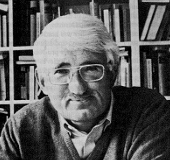Jürgen Habermas
From Geography

Habermas, born in 1929, is a famous German philosopher and sociologist. He is recognized as one of the most influential post war thinkers on topics such as capitalist society, democracy, politics, reason and language. Also he is considerd one of the world's most foremost contemporary social theorists.
Contents |
Work of Habermas
Habermas has been concerned with the life world, with knowledge and communication, and how it changes the modern world. He is concerned in what he calls the changes in the public and private spheres. Also he has worries about the future of democracy as the media expand and proposes a theory of communicative action (Macionis & Plummer, 2008, p.734). The theory of communicative action is within the work of Habermas the one that has make the biggest contribution to the field of human geography. Habermas's theory of communicative action did not replace `intersubjectivity', but anchored the explanation of social order in general in the validity claims of speech acts (Zierhoffer, 2002, p. 1359). So Habermas makes a move from intersubjectivity to the validity of speech acts. This move is the shift from a philosophy of consciousness to a philosophy of language (Schnädelbach, 1985). So Habermas has brought a major contribution in the autonomy of the social. Habermas's notion of modernity as an unfinished project (1990) represents a classical modernist stance. On the other hand, his Language Pragmatics offers a very sophisticated account of the discursive constitution of entities and in this sense constitutes a profoundly nonmetaphysical model of thinking (Zierhoffer, 2002, p. 1357).
Jürgen Habermas: speech acts and validity claims
Habermas has done the ground work for the development of the concept of speech act. According to Habermas speech acts should be seen as social action. There are three universal types of speech acts (Werlen, 2009, presentation):
- Constitutive: descriptive etc.: cognitive level (truth)
- Expressive: desiring, hoping etc.: intentions and attitudes(truthfulness)
- Regulative: excusing, ordering, warning etc.: social norms and institutions (correctness)
Each speech act needs to be valid for Habermas since his goal is to create an ideal speech situation. He comes up with four types of validity claims:
- Comprehensibility (understandability)
- Truth (consensuality)
- Truthfulness (sincerity)
- Correctness (normativity)
To reach an ideal speech situations the four criterions of validity have to be adopted under condition of rationally legitimized consensus. For that four requirements have to be fulfilled:
- 1 Communicative speech acts (open to critics)
- 2 Disclosure and critique of ‘prejudices’ (Vormeinungen)
- 3 Application of truthfulness
- 4 Use of regulative speech acts
Influence
Although Habermas himself does not write extensively about space or geography his ideas about speech act as well as concepts such as Husserl’s lifeworld and social action in society have been extensively used and further developed by geographers such as Benno Werlen and Wolfgang Zierhofer in their action theoretical approaches to human geography.
Habermas: instrumental and communicative rationality
In the social action theory by Habermas, argumentation is no longer grasped as a kind of philosophical activity but is instead seen as a practical means of producing and reproducing) (autopoietic) social order and structuring society (Zierhofer, 2002). He formed two ideal type of structures of communication (modes of thought): instrumental and communicative rationality, which distinct two forms of action coordination.
- Istrumental rationality is focusing on the most efficient or cost-effective means to achieve a specific goal, but not itself reflecting on the value of that goal (or 'end'). In critically evaluating actions, instrumental rationality tends to focus on the 'how' of an action, rather than on its 'why'.
- In opposite, communicative rationality is focussing on the more normative aspects of social action and communication. Habermas defines it as those communicative conditions in which all kinds of validity claims may be articulated (Zierhofer, 2002). In opposite to instrumental rationality, the communicative rationality focusses on the 'why' of an action.
In the next youtube video the instrumental and communicative rationality are explained
http://www.youtube.com/watch?v=G6e61XqLRBo&list=LP9FKheBtu08U&index=21&feature=plcp
References
- Johnsten, R.T., Gregory, D., Pratt, G., & Watts, M. (2000). The dictionary of Human Geography (Electronic Version). Blackwell Publishing: Oxford.
- Macionis, J. & Plummer, K. (2008). Sociology. A global introduction. 4th editoin, Pearson Education LTD
- Schnädelback, H. (1985). Philosophie , in philosophie Eds E Martens. Humburg: Rowohlt.
- Werlen, B, (2009). Presentation on speech act.
- Zierhofer, W. (2002). Speech acts and space(s): language pragmatics and the discursive constitution of the social. Environment and Planning A, 34, 1355-1372.
Contributors
- Published by Henk-Jan van Maanen & Ingram Smit
- Links added and image inserted by Aafke Brus --AafkeBrus 12:30, 31 October 2011 (CET)
- Page enhanced and improved by Lars-Olof Haverkort --LarsHaverkort 18:09, 22 September 2012 (CEST)
- Page added to the category Late-modernity by Anke Janssen
- Page enhanced by Pieter van Luijk 23 October 2012.
- Page edited by --MichielVanRijn 00:47, 26 October 2012 (CEST)